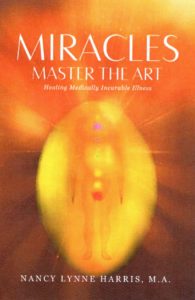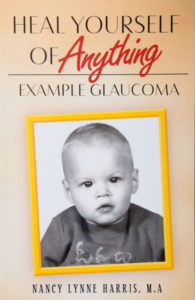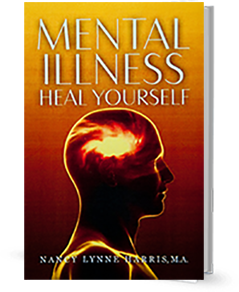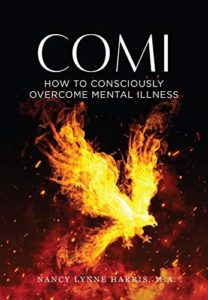- Miracles Master the Art: Healing Medically Incurable Illness
- Heal Yourself of Anything: Example Glaucoma
- Invasion Revealed: Healing Alcoholism, Mental Illness & Drug Addiction
- Mental Illness Heal Yourself
- COMI: How to Consciously Overcome Mental Illness
by Nancy Lynne Harris, M.A.
GodSpirits United, LLC
reviewed by Rebecca L. Morgan
“What is going on in your own mind is projecting what you are experiencing in your body and in the world, whether or not you are aware of it.”

Through spiritually driven text, the power of our thoughts and their impact on our body is analyzed in this enlightening guide that provides a step-by-step solution to transforming your mental and physical health. A long-time student and practitioner of shamanism and energy healing, the author proficiently details the thought process required to manifest desired outcomes when projecting positivity. By acknowledging that thoughts create experience, the reader is presented an encouraging pathway to reverse thinking by establishing an understanding and love of one’s self. This holistic approach to well-being is skillfully communicated through the author’s willingness to share deeply personal experiences of loss and illness in order to impart the benefits of gaining control of your mind and body with your thinking.
The energy that surrounds words and their ability to both destroy and heal is thoroughly explored in this guide which emphasizes reversing negative patterns through the precise selection of opposite thoughts. According to the author, choosing the exact positive word to incorporate into your thinking is paramount to weakening and abolishing the negative effects that are occurring to the body. Through a systemic practice of instilling positive affirmations as a fundamental element to one’s daily thought process, a greater awareness of self is revealed, and a channel to recovery is illuminated. Biblical scripture is cited throughout the book with thought-provoking examinations of the text by reviewing the meaning of select words and how they can be misinterpreted, allowing for an enhanced perspective on divine guidance. Readers seeking relief from physical or emotional pain, dysfunction, illness or disease, will find an inspirational approach to health and wellness in this contemplative narrative that reinforces the reflection of one’s thoughts and behaviors in order to unveil relief from painful ailments and emotions.
RECOMMENDED by the US Review
by Nancy Lynne Harris, M.A.
reviewed by Donna Ford
“To make a positive change in your health you have to change the negative words in your mind that are causing a…manifestation in…your body.”

The author has written this self-help book to document the amazing healing of her young son who was born with glaucoma.This eye condition involves high pressure that can result in sight loss. Feeling pressured by a family member during and after her pregnancy, the author realized that she repeatedly verbalized that word. Refusing any longer to dwell on or speak about pressure, within a relatively short time the author’s son was healed of glaucoma—much to the delight of this mother and surprise to his doctor.
Chapter 3 covers the three steps to take for healing: Empty out by changing your way of thinking; Fill your mind with at least 51% positive thoughts; Reflect on the positive to share with others since minds are linked. Chapter 5 explains certain eyesight conditions, addressing attitudes that cause them and providing words to speak to overcome these conditions. Someone with nearsightedness can learn to see higher, deeper, and farther. Those with hindsight, who keep looking backward, can begin to say, “My future is unfolding in wonderful ways.” Harris urges readers to recognize that thoughts are like the code that runs behind a software program on a computer or mobile phone. Your thoughts are what regulate your body chemistry. They also are responsible for causing your specific life experience.
The author is a spiritual counselor with training in eschatology and the Walter method of Christian Science. The book contains a warning to continue using your medicine until you know for a fact that it is no longer needed. Readers will be inspired by blurbs and lists of positive statements to assist in healing body and mind. However, font choices, uppercase text, as well as narrow margins may make the book difficult to read for those with eyesight issues.
by Nancy Lynne Harris, M.A.
GodSpirits United, LLC
reviewed by Barbara Bamberger Scott
“The lesson we all have to learn and demonstrate is the triumphant power of Self-Love.”

Shaman and spiritual teacher Nancy Lynne Harris states that we can heal ourselves from addiction and mental illness by practicing the art of Self-Love. She describes her own journey to this truth. Her father was an alcoholic. He took prescription barbiturates, believing that doctors would cure him. He was found dead at age 51. She lost two sons and an ex-spouse to drugs and alcohol. For eight years she suffered from depression, going to counselors who prescribed various drugs for palliation. Then she had a powerful vision of evil spirits taking possession of her mind. She realized that she could heal herself by taking charge of her mental state and overcoming such demonic entities with authoritative, disarming messages. She thus began the process of Self-Love, recognizing that even the word “love” has the power to drive negativity out of one’s life.
Harris offers ten steps for self-healing such as praise yourself, give yourself permission to change, and retrain your negative self-talk. Basing her ideas partly on Biblical teaching, she compares these steps to Jesus driving demons out of suffering people. She calls addicts “dysfunctional people” but eschews the term “abnormal.” She sees them rather as demon-possessed and urges them to take immediate steps to love themselves and drive out their own demons, which she says are actual translucent spirits that can control one’s innermost thoughts. She offers curative affirmations (e.g. “I am an entity worth loving”) for inner healing. A summation of her teaching is that “thinking ‘I love myself’ is the best medicine you can ever take.” Consisting of only 49 pages, Harris’ book may be too short to completely articulate a compelling message and provide a methodology sufficient to heal addiction, but it can be a starting place for the determined few.
 Mental Illness Heal Yourself
Mental Illness Heal Yourself
by Nancy Lynne Harris, M.A. URLink Print and Media
Book review by Donna Ford
“If you are a mentally ill person, then you are the person who needs to understand what I say here.”
Anyone dealing with their own mental illness has three options: 1. Stay as you are; 2. Expect someone else to heal you; 3. Take charge and heal yourself. The author spent eight years living with options 1 and 2. Negative thoughts resulted in her contemplating suicide. Once she chose option 3, it took only eight months to regain complete sanity. Harris’ mother had taught that loving oneself was wrong. Instead, speaking aloud positive affirmations of love was the technique the author used to turn the tide. This method can be of special use to quiet tormenting voices inside one’s head, even other personalities/demons, which speak blame and self-hatred. Within the mental stillness that will result, a mentally ill person becomes able to shift energy toward healing.
Harris is a gifted spiritual teacher and shaman who has helped those with depression, alcoholism, mental illness, and glaucoma (stress-related eye disease). After the death of a son, Harris spent eight years trying to deal with her mental illness that resulted. Then a friend told her, “You are always in control of your own mind.” This brought the first ray of hope and started Harris speaking self-praise continually. According to the author, negative thoughts, like piranha fish, eat at one’s mind. As she so positively describes in her 60-page self-help book, stating the opposite of what one once believed can free troubled minds. This book could serve as a much-needed boost for those struggling with negativity, and many readers may benefit from the lists of affirming statements Harris includes in the book.

COMI: How to Consciously Overcome Mental Illness
by Nancy Lynne Harris, M.A.
URLink Print and Media, LLC
Book review by David Hennessee
“Mental illness is not something that happens to just a few people. It is a chronic worldwide problem that is caused because people do not know how to think correctly.”
Studies show that one in five Americans are afflicted with some form of mental illness during their lives, but two-thirds do not seek treatment due to feelings of shame. It is clear that effective treatments are needed, and author Harris, shaman and spiritual teacher, offers her thoughts on the problem of mental health. Her book outlines theories about the origins and causes of mental illness as well as coping and healing strategies for sufferers. Blending spiritual and positive thinking approaches, Harris affirms that all people contain the divine; however, in moments of pain, they can be invaded by evil spirits who create emotional suffering. Not metaphors, these spirits literally possess people and create symptoms. These malign invaders cause the negative thoughts that power mental illnesses. Therefore, drugs and diet changes will only temporarily soothe symptoms, not address the root causes of mental illness—invasive, enduring, and out-of-control destructive thought patterns.
This book makes a helpful distinction between transient negative thoughts and older, more entrenched thought patterns, which Harris labels “deep rolling thoughts.” Another concrete, promising strategy offered to combat negativity and foster mental health is the use of positive affirmations. Harris suggests taking control of damaging thoughts with mantras such as “I dissolve the need for self-destruction. I dissolve the need for self-persecution.” Readers not invested in a spiritual mindset may find the book’s attribution of mental illness to demonic beings hard to swallow. Additionally, those who believe the findings of science (that mental illnesses are often caused by chemical imbalances in the brain over which the patient has little if any control) may find the book’s treatment of this topic dismissive. However, in its insistence on the power of thought, the author’s book does present a strong case for the possibility of proactive, powerful self-healing.